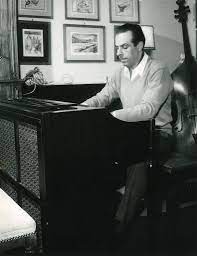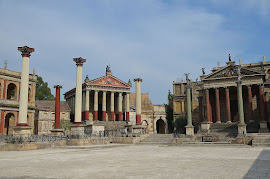Politician’s son gave up legal practice to write movie scores
Pianist, conductor and prolific composer Piero Piccioni was born on this day in 1921 in Turin in the northern region of Piedmont.Piccioni gave up a career as a
lawyer to compose film music
A self-taught musician, Piccioni became a composer of film soundtracks, writing more than 300 scores, themes and songs for top directors such as Francesco Rosi, Luchino Visconti, Bernardo Bertolucci, Roberto Rossellini and Vittoria De Sica.
Piccioni had come into contact with the film industry during the 1950s while practising as a lawyer in Rome and working to secure movie rights for Italian distributors such as Titanus and De Laurentiis.
His interest in music had started as a result of being taken to concerts by his father, Attilio Piccioni, who was a prominent Christian Democrat politician who served several times as deputy prime minister.
Although Piccioni never studied music formally, he became a talented musician by teaching himself. He had listened to jazz during his childhood and was a fan of Art Tatum and Charlie Parker. He was also influenced by 20th century classical composers and American cinematography and he started writing songs of his own.
Piccioni played the piano on radio for the first time in 1938 with his ‘013’ Big Band but did not go on air again until after the liberation of Italy in 1944. He had the distinction of being the only Italian pianist ever to play for Charlie Parker after he was called upon to substitute for the pianist Al Haig on a television programme filmed in New York in 1949.
 |
| Piccioni's musical ability was entirely self-taught |
His first feature film was Il mondo le condanna in 1952, after which he gave up law to write music full time. He wrote the music for most of the films that comic actor Alberto Sordi either took part in or directed. Many of the themes he composed for Sordi went on to become popular hits.
Piccioni won many prestigious prizes for his music, including the David di Donatello Award for the 1975 film Swept Away and the Nastro d’Argento award for the 1962 film Salvatore Giuliano. He also won the Anna Magnani award in 1975, the Vittorio De Sica Award in 1979 and the Prix International Lumiere in 1991.
In 1953, Piccioni had been implicated in the Montesi scandal, which followed the discovery of a dead Italian woman on a beach near Rome. He was given an alibi for the time of death by the actress Alida Valli who said he was with her at Carlo Ponti’s villa in southern Italy. He was acquitted of any involvement in the death at a trial three years later and a journalist who had written about Piccioni recanted his allegations after legal action was taken against him.
Piccioni died in Rome in 2004 at the age of 82, leaving a widow, the former musical star Gloria Paul, and their two children, Jason and Valentina.
Travel tip:Turin is a city of understated elegance
with a vibrant café culture
Turin, the capital city of the region of Piedmont, where Piero Piccioni was born, has some fine architecture that illustrates its rich history as the home of the Savoy Kings of Italy. Piazza Castello, with the royal palace, royal library and Palazzo Madama, which used to house the Italian senate, is at the heart of ‘royal’ Turin. An elegant, stylish and sophisticated city, Turin has much to commend it, from its many historic cafés to 12 miles of arcaded streets and some of the finest restaurants in Piedmont. In the 19th century, the city’s cafés were popular with writers, artists, philosophers, musicians and politicians among others, who would meet to discuss the affairs of the day.
Travel tip:The 'ancient Rome' set is one of the
highlights of the Cinecittà studio complex
Rome, where Piero Piccioni lived for many years of his life, became the hub of the Italian film industry because of Cinecittà, a large studio complex to the south of the city, built during the Fascist era under the personal direction of Benito Mussolini and his son, Vittorio. The studios were bombed by the Allies in the Second World War but were rebuilt and used again in the 1950s for large productions, such as Ben Hur. These days a range of productions, from television drama to music videos, are filmed there and Cinecittà has its own dedicated Metro stop.
Also on this day:
1478: The birth of Baldassare Castiglione, courtier, diplomat and writer
1586: The birth of astronomer Niccolò Zucchi
1794: The birth of opera singer Luigi Lablache
1975: The birth of businessman Andrea Agnelli



No comments:
Post a Comment